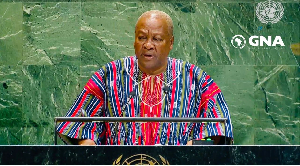The impacts of climate change on the environment and how it threatens the long-term survival of humanity cannot be overemphasized. There is no doubt that things that we depend upon and value, like water, energy, transportation, wildlife, agriculture, ecosystems, and human health are experiencing the effects of a changing climate.
Climate protection and restoration has become a global conundrum, therefore, the consciousness of best practices that would protect the environment, which have positive impacts on the climate must be encouraged. Even though there have been some level of efforts globally regarding the fight against climate change, there is still the need to intensify the fight to quicken the quest of climate change adaptation and restoration.
It is in line with this that, Water for Rural Africa (WRA) is using the opportunity to congratulate the Ministry of Local Government and Rural Development (MLGRD) for hosting the second edition of the Africa Climate Chance summit, with support from other Ministries, Agencies and Associations which include Ministry of Environment, Science, Technology and Innovation, Ministry of information, Environmental Protection Agency (EPA), the United Cities and Local Government-Africa (UCLGs), National Association of Local Authorities of Ghana (NALAG), and the Climate Chance Association.
However, WRA is urging the Ministry of Sanitation and Water Resources to join the summit and play an active role. This is fundamental because, the effects of climate change have a direct impact on water and aquatic life. We can only talk about, Agriculture, Food Security and Sustainable Building if water is first and foremost tackled and assured.
While Northern Africa has 92% safe water coverage, according to reports, Sub-Saharan Africa remains at a low 60% of coverage, leaving a 40% of the 783 million people in that region without access to clean drinking water.
In 2010, the UN General Assembly explicitly recognized the human right to water and sanitation. And in that light, the Water and Sanitation Ministry must play an epic role in ensuring on availability, quality, and protection of the rights of every Ghanaian to have access to clean drinking water.
It is our hope that a conference of this nature will not only provide the platform for critical thinking and possible ways of mitigating the effect of climate change on entire ecosystem but specifically develop a robust framework to harness the available resources and chart a sustainable way forward to mitigating the devastating effect of climate change on water sustainability, availability, quality and on the aquatic environment. The conference should also probe further on the complexities and interconnectivity of water, agriculture, Sanitation, health and the climate.
According to WHO, “Safe and readily available water is important for public health, whether it is used for drinking, domestic use, food production or recreational purposes. Improved water supply and sanitation, and better management of water resources, can boost countries’ economic growth and can contribute greatly to poverty reduction”.
The global body further states that, “Climate change, increasing water scarcity, population growth, demographic changes and urbanization already pose challenges for water supply systems. By 2025, half of the world’s population will be living in water-stressed areas”
WRA also wishes to embolden the participating delegates to ensure that recommendations and tangible priority action plans that would to be carried out in the various African jurisdictions as a result of the summit, must be executed to the latter with total commitment and drive, in order to derive the expected outcomes.
General News of Friday, 20 September 2019
Source: Water for Rural Africa













